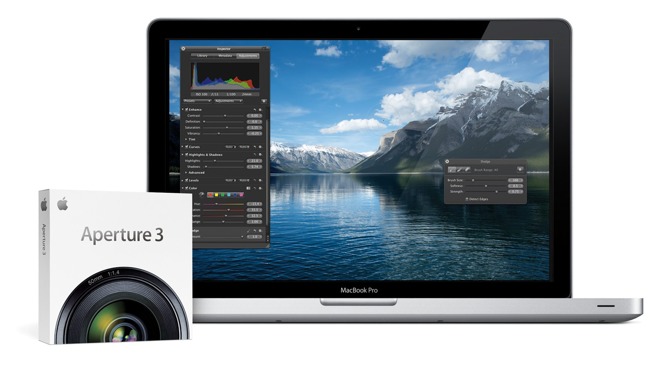Pro photo workflow tool Aperture won't work after macOS Mojave, Apple says
Flagging the end of an era, Aperture -- Apple's pro-oriented photo workflow software -- will no longer work in the next major version of macOS following Mojave, the company says.

The end-of-life announcement was made quietly through a new support document. Aperture owners are encouraged to migrate their libraries to the macOS Photos app or Adobe Lightroom Classic. With the latter, features like Smart Albums and custom metadata fields can't be converted.
Aperture's non-destructive layers can be carried over to Lightroom, though only by importing files after the rest of a library has been migrated.
Apple killed further development of Aperture in 2014, and pulled it from the Mac App Store in April the next year. The product was likely impacted by Apple's distance from pro software at the time, combined with the growing popularity of Lightroom. Lightroom is not only integrated with other Adobe tools like Photoshop, but cross-platform, whereas Aperture was always Mac-only.
The ultimate fate of Aperture was clear, but a loyal core of users tested beta releases of macOS prior to release over the last five years and reported back to a larger community. MacRumors found Apple's updated page on early Tuesday.
The next major macOS update should be announced at WWDC 2019 and launch this fall. The software will complete Apple's transition away from 32-bit support, and in fact the company is warning people now to convert older iMovie, Final Cut, and Motion files if they want that media to remain useable.

The end-of-life announcement was made quietly through a new support document. Aperture owners are encouraged to migrate their libraries to the macOS Photos app or Adobe Lightroom Classic. With the latter, features like Smart Albums and custom metadata fields can't be converted.
Aperture's non-destructive layers can be carried over to Lightroom, though only by importing files after the rest of a library has been migrated.
Apple killed further development of Aperture in 2014, and pulled it from the Mac App Store in April the next year. The product was likely impacted by Apple's distance from pro software at the time, combined with the growing popularity of Lightroom. Lightroom is not only integrated with other Adobe tools like Photoshop, but cross-platform, whereas Aperture was always Mac-only.
The ultimate fate of Aperture was clear, but a loyal core of users tested beta releases of macOS prior to release over the last five years and reported back to a larger community. MacRumors found Apple's updated page on early Tuesday.
The next major macOS update should be announced at WWDC 2019 and launch this fall. The software will complete Apple's transition away from 32-bit support, and in fact the company is warning people now to convert older iMovie, Final Cut, and Motion files if they want that media to remain useable.

Comments
So does Mojave kill all apps which are not 64 bits or is there something else going on. I am just pissed I can no longer sync books between my computer and IOS device when I updated my IOS devices to iOS 12 which said you need Mojave on your computer to make it work. Apple had be kind stuck between a rock and a hard place at this point. Just unclear what will break with the next update. I have a number of older apps and utilities I use and do not wish to spend more money to get subscription based apps.
I think this is the dirty little secret Apple had with the developer world. They will eventually kill any old apps from work in OSX and if users want to keep up to date they will be force to go to a software subscription model. Quicken did it to me since they disable online access to any financial institutions for the standalone app. You had to go to a subscription base app to maintain online access. They also said the standalone app would no longer work in Mojave so they tied to the two things together.
Do not upgrade to the replacement for Mojave coming later this year until you have found suitable replacements for your 32-bit software or are prepared to dual-boot your computer or use a VM for the handful of 32-bit programs you still use.
I’ve finally found replacements for my primary 32-bit apps. Quicken 2007 was replaced with GnuCash and Pastor was replaced with MacPass.
As an anecdote I’ll tell you about a friend of mine who worked for IBM during the Y2K frenzy. He supported older IBM hardware that needed both hardware and software updates to continue working after the infamous date change. He told me about small companies who stubbornly refused to pay for or install the updates for reasons beyond his comprehension. He had to inform them that as of 1/1/2000 their machines would no longer function properly. A few went as far as to say they would simply go out of business when that happened. How’s that for stubbornness?
Maybe there was an ultimatum secretly given to Apple from Adobe to kill it, or CS would go PC only.
The fact that a lot of people still use Aperture shows that it was a decent application that Apple made and yet they decided to kill it instead of making it open source or selling it outright.
Hopefully Photos will continue to improve.
If you kept all your photos in Aperture, the best thing to do is export high quality JPG's or TIFF's from the edits, and and save the files outside of the Aperture catalog. Eventually, someone may develop an app that can open Aperture catalogs.
A well written app can be recompiled with minimal fuss to be 64-bit, not sure why Apple won't just do that as it still is quite popular.